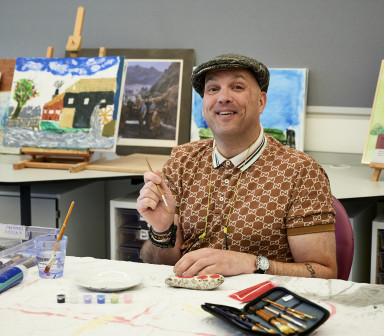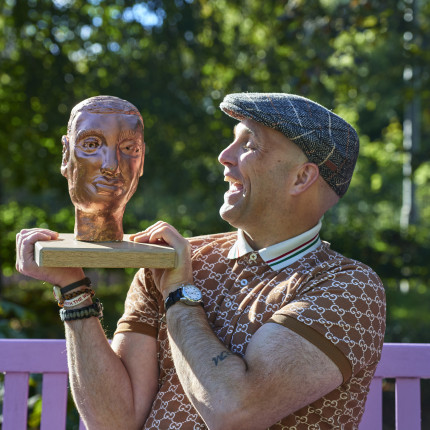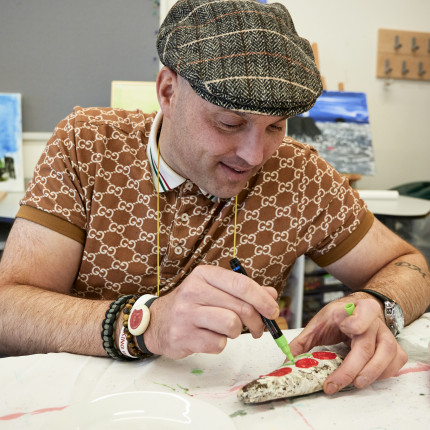Former soldier David Martin survived being on the frontline in Afghanistan, but the biggest fight of his life followed after he was involved in a near-fatal car crash.
David, 39, who was serving in the 3rd Battalion The Royal Regiment of Scotland (Black Watch), had been given permission from his Sergeant Major to attend the funeral of his Dad’s brother, so long as the corporal returned to duty four days later – but he never did.
In 2013 on the drive to his uncle’s funeral, David hit black ice on the A9, lost control of his car, and careered into a tree. He needed to be air-lifted to hospital and soon was transferred to the Southern General Hospital in Glasgow for life-saving surgery after sustaining a horrific brain injury. David was only 29 at the time of the accident.

He said: “I stood up to try and walk – but I was paralysed down one side of my body! I was a PTI (physical training instructor) in the Army but now I couldn’t even walk. I didn’t know what had happened to me. At first I thought I had suffered an accident during a training exercise.
“I read, on an A4 piece of paper, ‘Hello. My name is David Martin. I was on the A9 and I hit a tree. I was in a car crash and I have been in a traumatic brain-injured coma’. I was totally shocked to read that.
“In the Army, I once watched a PowerPoint presentation that said soldiers are injured or killed on roads on patrol in Afghanistan. I never thought to think about it until I was lying in a hospital bed – only I was nearly killed in Scotland.”
For the next two-and-a-half years, David stayed in hospital, as a patient at Graham Anderson House, in Glasgow, a specialist rehabilitation hospital for people with brain injuries. There he re-learned life’s most basic skills, like talking, walking, cooking and and setting up direct debits.
David, from Barrhead in East Renfrewshire, explained: “I had to learn how to engage in conversations again, and learn life skills like paying bills. It was a long process.
“I used to only say one-word answers to people if they asked me a question, but now I have found my voice again. I am so happy to be alive, that my heart is beating and I am engaging in activities again.”
“I now see my brain injury as a kind of blessing as I am now engaging in activities and meeting so many different people that I would not have ever thought about pre-brain injury.”
For the former physical training instructor, who served for five-and-a- half years in the Black Watch before his accident, it completely transformed his life.
He admits: “I was so physical before, going to the gym constantly to build the guns. I used to love running and I ran the Dublin Marathon in 3 hours 36 minutes.”
However, during his recovery and to this day, David receives support from Sight Scotland Veterans. We provide practical and emotional support to David, and servicemen and women of all ages, who have not only lost their sight, but have visual impairment.
A common misconception is that ‘you have to be blinded’ to be qualify for help from Sight Scotland Veterans, and this was David’s belief too when a friend first told him about the good work of the charity.
The 39-year-old added: “I went fishing with a friend of mine and he said ‘can I ask a personal question? Did your accident cause any sight loss?’
“I looked at him closely and told him my right eye has 80% sight loss and the rest is blurred.
“Then he told me about Sight Scotland Veterans – at the time, I didn’t know this charity existed, so I contacted them and they sent an outreach worker out to do an assessment. I told them ‘I have one good eye and one bad eye, so do I qualify?’
“I didn’t think I would, but I was so glad I did.”

He said: “I am now going to the centre every Friday and I use the art room or IT suite. I am always doing activities now like kayaking, climbing and I have joined an angling club. I have a Go-Pro now, so I will be recording videos and will ask the IT guy to help me download the footage.
“I now see my brain injury as a kind of blessing as I am now engaging in activities and meeting so many different people that I would not have ever thought about pre-brain injury.”
And when it comes to practical help, Sight Scotland Veterans was there for David too, setting up his Google Nest Home, so it would remind him when to take his medication, at home and when he is out with phone reminders, to prevent seizures.
Now you may recognise David, for he is the current star of our touching television advert as he was chosen alongside other veterans to front our charity’s latest media campaign. For Sight Scotland Veterans, there was no one better suited to this role because of the positivity David oozes.
Mairi Sutherland, marketing manager at Sight Scotland Veterans said: “From the day I joined Sight Scotland Veterans, everyone in the team was ‘you have to meet David’. When I met him, I realised what a special person he was.”
And veteran John Reilly, who works at Hawkhead Centre in Paisley, added: “I get quite emotional talking about David. He has so much warmth and positivity. If we are feeling down, you only need to look at him and your spirit will be lifted. David will do anything, he has such a buzz for life.
“He is a total ambassador for this organisation.”
David added: “It’s bizarre to think that I am an ambassador, but I am over the moon about hearing this.”
If you or someone you know has served in the Armed Forces, and is struggling with any form of sight loss or visual impairment, including some of the most common (macular degeneration and glaucoma), get in touch for free support.

Stay connected to the things that matter to you
Get expert advice and practical help for yourself or a veteran you care for by completing the form below or calling the number at the top right of your screen. Our freephone line is open for calls 10am - 4pm Monday to Thursday and 10am - 1pm Friday.